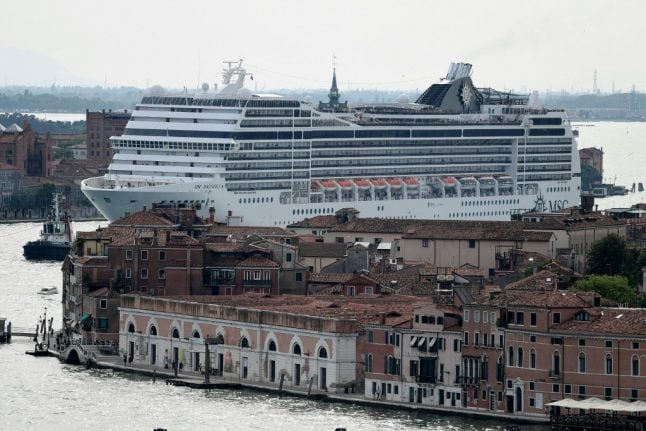MSC Cruises and Costa Cruises announced this week that their first Mediterranean cruises after a months-long hiatus due to the pandemic would depart from Genoa and Trieste, larger ports that make new coronavirus-related regulations, such as social distancing, easier to ensure.
On Friday, the group No Grandi Navi (No Big Ships) plans an evening gathering to celebrate what organisers called a small step forward in an eight-year battle to ban the massive ships from Venice's environmentally fragile waters.
No departures from the UNESCO-listed city are planned for the rest of the year, as the two companies trim back their schedules and itineraries. Many big cruise ships will also be skipping Venice as a port of call.
“This isn't the final victory. But it's an important step and we believe it opens a new phase of negotiations in which the game has changed,” No Grandi Navi committee member Marta Sottoriva told AFP.
The port of Venice is a major economic driver for the city, bringing in hoards of day-trippers who swell the number of annual visits to the city to over 30 million, according to some estimates.
Environmentalists charge that massive waves generated from the hulking liners, which are often hundreds of metres long and several stories high, erode the foundations of the floating city.
No Grandi Navi warned earlier this month it would resort to unspecified “sabotage” were the big ships to return to Venice for the key August tourist season.
The pandemic has laid bare the reality that Venice should not rely solely on tourism to sustain its economy, Sottoriva said.
The group argues that the current crisis opens the door to a new, more balanced development model for the city, but political will is required.
Complicating the issue for city authorities are port employees who have not worked since March.
On Monday, workers held a protest at Venice's maritime terminal – usually home to 30 cruise operators – with banners proclaiming that as many as four million cruise-related jobs, from baggage handlers and tug operators to hotel workers, were put at risk by the decision to use alternate ports.
“Calling into question cruises in Venice is not a simple environmental or image issue, you can't play with the future of workers and families,” they said in a statement, as reported by Venetoeconomia.it news portal.
Faced with no employment for the rest of the year, workers said they were launching “a cry of alarm and concern that does not exclude further demonstrations in coming weeks.”
Both the environmentalists and workers decry what they call silence from politicians, and long-stalled decisions on proposals to reroute cruise ships to bypass the lagoon in front of Saint Mark's Square.



 Please whitelist us to continue reading.
Please whitelist us to continue reading.
Member comments